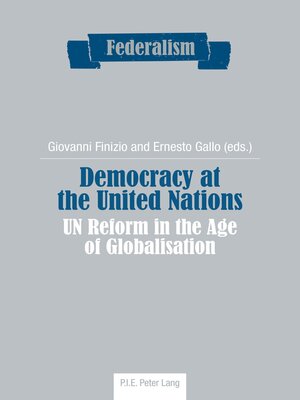Democracy at the United Nations
ebook ∣ UN Reform in the Age of Globalisation · Federalism
By Giovanni Finizio

Sign up to save your library
With an OverDrive account, you can save your favorite libraries for at-a-glance information about availability. Find out more about OverDrive accounts.
Find this title in Libby, the library reading app by OverDrive.



Search for a digital library with this title
Title found at these libraries:
| Library Name | Distance |
|---|---|
| Loading... |
What role should the United Nations play in a globalising world? How can it support and embody international democracy? The decline of state sovereignty, an effect of globalisation, is bringing about a crisis both in politics, as a tool to pursue the common good, and in democracy, as the key instrument by which we can control our destinies. The UN, the only organisation with broad political goals and worldwide jurisdiction, has the potential to manage globalisation democratically and promote the common good of humanity. However, it is still controlled by nation states and operates according to power relations typical of the pre-globalisation era. UN reform is therefore crucial, today more than ever.
This book examines two areas of reform: first, the creation of a democratic assembly in which world citizens are represented, in order to adapt democracy to meet the challenges of globalisation; and second, the strengthening of the Security Council through democratisation and regionalisation, in order to ensure world security, whose characteristics have evolved significantly in the global age. The contributors come from a wide variety of different backgrounds, including political science, sociology, economics, law, philosophy and history, providing a multifaceted and multidisciplinary debate on this important topic.
This book examines two areas of reform: first, the creation of a democratic assembly in which world citizens are represented, in order to adapt democracy to meet the challenges of globalisation; and second, the strengthening of the Security Council through democratisation and regionalisation, in order to ensure world security, whose characteristics have evolved significantly in the global age. The contributors come from a wide variety of different backgrounds, including political science, sociology, economics, law, philosophy and history, providing a multifaceted and multidisciplinary debate on this important topic.







